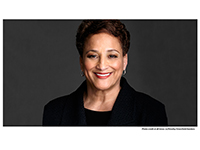Help for Those Who Protect Your Money
Banks can do more to safeguard retirement savings
En español | Roughly 18.5 million family caregivers provide unpaid financial management assistance to a person 50 or older in this country. While many of them can handle routine and sometimes complex financial tasks, they often lack needed information to carry out the tasks of financial caregiving. As we celebrate November as National Family Caregivers Month, we are reminded that they need help.
That's why AARP created BankSafe, a collaborative initiative with financial institutions to better meet the needs of people 50 and over. BankSafe is based on four fundamental principles.
Protecting older consumers
Financial exploitation, which includes consumer fraud, scams and theft, is the fastest growing form of older adult abuse, affecting 1 in 5 older Americans and costing them an estimated $3 billion per year. This translates into an average loss for an older victim of about $120,300, roughly the amount a typical 50-plus household has in retirement savings. Actual losses are likely even higher since financial exploitation, like many other forms of elder abuse, often goes unreported.
Financial exploitation of older adults also affects financial institutions, which lost an estimated $1 billion in deposits in 2012 because of fraud committed against people 50 and older.
BankSafe will offer training and resources so bank employees and financial advisers can recognize signs of exploitation and offer customers guidance on finding solutions.
See Also: Money and Memory - A Coming Concern
Video: Financial Tips for Family Caregivers - Money expert and AARP financial ambassador Jean Chatzky shares top 5 financial tips for family caregivers.
Empowering financial caregivers
Family caregivers and bankers are often not aware of tools and resources that can effectively manage a loved one's money. For example, text alerts can warn caregivers about unusual withdrawals or about a bank account being closed suddenly. Some financial institutions now allow an account holder to designate an emergency contact for the bank to call if there is a health or security concern. Many financial institutions are also beginning to offer new products and features such as third-party monitoring, also known as "read only," which authorizes a family member or friend to monitor an older adult's account for irregularities, but does not provide access to funds or the ability to make transactions.
Helping those with dementia
Many financial caregivers are helping to manage a loved one's finances because of a decline in cognitive ability. One of the first warning signs of dementia in older adults is the inability to manage finances. With BankSafe, employees of financial institutions can receive training to identify the signs that a customer is having difficulty with banking and financial transactions, and to provide appropriate customer service and referral information.
See Also: How to Spot Early Warning Signs of Elder Financial Abuse
Making the banking environment easy to access
For someone of any age who has issues with vision, hearing, mobility or cognitive function, simple banking and financial transactions can be a challenge. Banks can implement simple measures and use technology to improve the customer experience. For example, written and online statements should be easy to read, and mobile or remote access should be safe and secure without being complicated.
Through BankSafe partnerships, AARP is working to protect individuals from exploitation, give financial caregivers the tools they need and educate financial institutions about how to fight exploitation and protect consumers of all ages.
For more information on providing financial caregiving and fighting exploitation, go to aarp.org/banksafe.
Jo Ann Jenkins is CEO of AARP.


